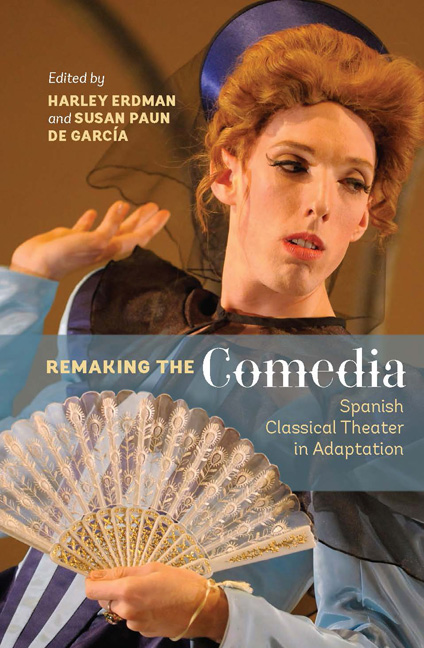Book contents
- Frontmatter
- Contents
- Illustrations
- Contributors
- Preface
- Note to the Reader
- Acknowledgements
- PART I THEORIZING
- PART II SURVEYING
- 5 Refundición Redux: Revisiting the Rewritten Comedia
- 6 Pepe Estruch and the Performance of Golden Age Drama: International Relationships under Franco and Democratic Theatrical Cultures
- 7 Thinking Globally, Acting Locally, and Performing Nationalism: Local, National, and Global Remakes of the Comedia
- 8 Four Decades of the Chamizal Siglo de Oro Drama Festival and the Evolution of Comedia Performance
- 9 Early Modern Dramaturgas: A Contemporary Performance History
- 10 Adapting Lope de Vega for the English-Speaking Stage
- PART III SPOTLIGHTING
- PART IV SHIFTING
- Play Titles Cited
- Works Cited
- Index
6 - Pepe Estruch and the Performance of Golden Age Drama: International Relationships under Franco and Democratic Theatrical Cultures
from PART II - SURVEYING
Published online by Cambridge University Press: 05 December 2015
- Frontmatter
- Contents
- Illustrations
- Contributors
- Preface
- Note to the Reader
- Acknowledgements
- PART I THEORIZING
- PART II SURVEYING
- 5 Refundición Redux: Revisiting the Rewritten Comedia
- 6 Pepe Estruch and the Performance of Golden Age Drama: International Relationships under Franco and Democratic Theatrical Cultures
- 7 Thinking Globally, Acting Locally, and Performing Nationalism: Local, National, and Global Remakes of the Comedia
- 8 Four Decades of the Chamizal Siglo de Oro Drama Festival and the Evolution of Comedia Performance
- 9 Early Modern Dramaturgas: A Contemporary Performance History
- 10 Adapting Lope de Vega for the English-Speaking Stage
- PART III SPOTLIGHTING
- PART IV SHIFTING
- Play Titles Cited
- Works Cited
- Index
Summary
A production of La vida es sueño staged by Helena Pimenta—artistic director of the Compañía Nacional de Teatro Clásico (CNTC)—is fast staking its claim to being the Comedia's biggest commercial and critical success on the twenty-first-century Spanish stage. Having previously played Hamlet, Blanca Portillo here tackles Golden Age theatre's best-known troubled young man; in press interviews, the well-respected stage and screen actress recalled studying Calderón's most canonical play with José (Pepe) Estruch some three decades earlier.
Having learnt the art of theatre and pedagogy in the UK and Uruguay, Estruch returned to Spain in 1967, where he dedicated himself almost exclusively to teaching: “ya no hago teatro por hacer teatro. Lo hago por enseñar a otros cómo hacerlo, sugerir formas, darles ejemplos, abrir caminos, despertar curiosidades” [“I no longer do theatre for the sake of doing it. I do it to teach others how to do it, to suggest forms, to give examples, to open pathways, to awaken curiosities”] (cited in Rojo). According to Eduardo Vasco, artistic director of the CNTC from 2004 to 2011, Estruch was crucial to a proper understanding of the evolution of the staging of the classics in Spain (CNTC). My aim here is to substantiate this claim and, in the process, to complement the predominantly descriptive and bio graphical scholarly work previously undertaken on Estruch by locating the activities of this Republican exile within a broader analytical framework which will seek to advance two interrelated arguments: that Estruch's transnational pedagogical labour can be construed as simultaneously being a prosaic yet powerful form of adaptation; and that the established academic discipline of exile studies and the nascent scholarly field of Comedia performance would mutually benefit from an interchange of ideas and experiences.
Pepe Estruch was born into a Masonic left-wing political family from Alicante in 1916. Having studied engineering at Madrid's famous Residencia de Estudiantes, he held a number of important administrative and cultural posts during the Civil War for the Republic's Ministries of Propaganda and State in Valencia and Barcelona respectively.
- Type
- Chapter
- Information
- Remaking the ComediaSpanish Classical Theater in Adaptation, pp. 55 - 64Publisher: Boydell & BrewerPrint publication year: 2015



